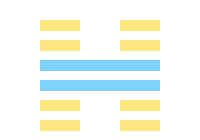38.1.2.3.6 (38 > 62)

38.1.2.3.6 (38 > 62) - THE KHWEI HEXAGRAM.
- 1. The first line, undivided, shows that (to its subject) occasion for repentance will disappear. He has lost his horses, but let him not seek for them ;--they will return of themselves. Should he meet with bad men, he will not err (in communicating with them).
- 2. The second line, undivided, shows its subject happening to meet with his lord in a bye-passage. There will be no error.
- 3. In the third line, divided, we see one whose carriage is dragged back, while the oxen in it are pushed back, and he is himself subjected to the shaving of his head and the cutting dff of his nose. There is no good beginning, but there will be a good end.
- 6. The topmost line, undivided, shows its subject solitary amidst the (prevailing) disunion. (In the subject of the third line, he seems to) see a pig bearing on its back a load of mud, (or fancies) there is a carriage full of ghosts. He first bends his bow against him, and afterwards unbends it, (for he discovers) that he is not an assailant to injure, but a near relative. Going forward, he shall meet with (genial) rain, and there will be good fortune.
38.1.2.3.6 (38 > 62) - Looking for a solution
One contacts those who can tell us what to do.
Bing DeepL Google Yandex38.1.2.3.6 (38 > 62) - Looking for a solution
One contacts those who can tell us what to do.
Bing DeepL Google Yandex38.1.2.3.6 (38 > 62) - Kwei, l’opposition
Kwèi : 1. Différent, opposé, éloigné, étrange ; 2. Regarder fixement.
-
1. Quand (il n’y a pas d’opposition, mais concorde, que) toute cause funeste disparaît (on revient à l’union comme) un cheval perdu qui revient de lui-même sans qu’on le cherche.
Si l’on rencontre un méchant même, il n’en surviendra rien de fâcheux (on saura se préserver de ses coups ou éviter son contact corrupteur). -
2. Si l’on s’accorde en route avec son chef, tout réussira. On ne se trompe pas de chemin. — Ou : Si l’on rencontre son chef c’est qu’on ne s’est pas trompé de chemin.
Si l’on a un différend et qu’on se cherche et s’accorde, on se rencontrera sans effet funeste. - 3. (Effets de la discorde, des luttes.) On voit un char entraîné par la force, son boeuf saisi et arraché, son conducteur maltraité et le nez coupé. Mais un commencement fâcheux peut avoir une bonne fin, si l’union se rétablit.
- 6. Seul dans la désunion, le banni est comme quelqu’un qui voit un porc immonde ou un char plein de mauvais esprits. Il tend d’abord son arc pour tirer, puis le lâche. Si ce n’est point un méchant, un brigand ravisseur et que le sort lui soit favorable, le bonheur reviendra.
38.1.2.3.6 (38 > 62) - Chercher une solution
On contacte ceux qui peuvent dire ce qu'il faut faire.
Bing DeepL Google Yandex38.1.2.3.6 (38 > 62) - Félreértés
- 1. A barátok akik elmentek visszatérnek, a becsmérlő emberek pedig elcsendesednek ha valaki megőrzi béketűrését.
- 2. Találkozás egy távoli ismerőssel.
- 3. Meg kell feleljen az igényeknek mielőtt elfogadnák.
- 6. El akarja zavarni a másikat aztán meggondolja magát a másik barátságos kérdései hallatán.
Les trigrammes
Les trigrammes sont des combinaisons de trois traits yin et yang. Dans l'hexagramme, les trois traits du dessous constituent le trigramme inférieur et représentent la situation intérieure. Les trois lignes du haut constituent le trigramme supérieur et représentent la situation extérieure.
Trigramme supérieur : Le feu Le tonnerre


Trigramme inférieur : Le lac La montagne


La formation: 38
What is already there

38 - THE KHWEI HEXAGRAM.
Khwei indicates that, (notwithstanding the condition of things which it denotes), in small matters there will (still) be good success.
Bing DeepL Google Yandex38 - Misunderstanding
One must revisit a misunderstanding if one wants to dispel it. If needed, one can seek advice. One may abandon the small differences.
Bing DeepL Google Yandex38 - Misunderstanding
One must revisit a misunderstanding if one wants to dispel it. If needed, one can seek advice. One may abandon the small differences.
Bing DeepL Google Yandex38 - Kwei, l’opposition
Kwèi : 1. Différent, opposé, éloigné, étrange ; 2. Regarder fixement.
Texte
Kwèi, temps mauvais où les petites affaires seules réussissent et les grandes point.
Symbolisme
Feu au-dessus, eau en dessous ; désunion. Ainsi le sage cherche l’union et la distinction (juste et convenable de ce qui doit être distingué).
Commentaire
Le feu, se mouvant au-dessus et l’eau en dessous, forment l’opposition ; de même deux soeurs vivant ensemble, mais ne s’entendant pas. L’attachement joyeux et intelligent fait que le faible et bon avance, s’élève et atteint le milieu, s’accordant ainsi avec le fort. Ainsi les petites affaires réussissent. Le ciel et la terre, bien que séparés, sont unis dans leur action. L’époux et l’épouse le sont également et doivent n’avoir qu’une seule volonté. Tous ces êtres sont distincts et leurs opérations identiques. Le principe, l’opportunité de la distinction sont choses bien graves.
38 - Le malentendu
On doit revenir sur un malentendu si on veut le dissiper. Au besoin, on peut demander conseil. On peut abandonner les petits différends.
Bing DeepL Google Yandex38 - Félreértés
Meg kell vizsgálni a félreértést ha el akarják oszlatni azt. Adott esetben lehet tanácsot kérni. A kis különbségeket fel lehet adni.
Bing DeepL Google Yandex
38.1 (38 > 64) - THE KHWEI HEXAGRAM.
The first line, undivided, shows that (to its subject) occasion for repentance will disappear. He has lost his horses, but let him not seek for them ;--they will return of themselves. Should he meet with bad men, he will not err (in communicating with them).
Bing DeepL Google Yandex38.1 (38 > 64) - Showing patience
Friends who have left will come back and derogatory people will calm down if one stays quiet.
Bing DeepL Google Yandex38.1 (38 > 64) - Showing patience
Friends who have left will come back and derogatory people will calm down if one stays quiet.
Bing DeepL Google Yandex38.1 (38 > 64) - Kwei, l’opposition
Kwèi : 1. Différent, opposé, éloigné, étrange ; 2. Regarder fixement.
Quand (il n’y a pas d’opposition, mais concorde, que) toute cause funeste disparaît (on revient à l’union comme) un cheval perdu qui revient de lui-même sans qu’on le cherche.
Si l’on rencontre un méchant même, il n’en surviendra rien de fâcheux (on saura se préserver de ses coups ou éviter son contact corrupteur).
38.1 (38 > 64) - Montrer sa patience
Les amis qui sont partis reviendront et les personnes désobligeantes se calmeront si on reste tranquille.
Bing DeepL Google Yandex38.1 (38 > 64) - Félreértés
A barátok akik elmentek visszatérnek, a becsmérlő emberek pedig elcsendesednek ha valaki megőrzi béketűrését.
Bing DeepL Google Yandex
38.2 (38 > 21) - THE KHWEI HEXAGRAM.
The second line, undivided, shows its subject happening to meet with his lord in a bye-passage. There will be no error.
Bing DeepL Google Yandex38.2 (38 > 21) - Recovering faith
One meets an acquaintance who had moved away.
Bing DeepL Google Yandex38.2 (38 > 21) - Recovering faith
One meets an acquaintance who had moved away.
Bing DeepL Google Yandex38.2 (38 > 21) - Kwei, l’opposition
Kwèi : 1. Différent, opposé, éloigné, étrange ; 2. Regarder fixement.
Si l’on s’accorde en route avec son chef, tout réussira. On ne se trompe pas de chemin. — Ou : Si l’on rencontre son chef c’est qu’on ne s’est pas trompé de chemin.
Si l’on a un différend et qu’on se cherche et s’accorde, on se rencontrera sans effet funeste.
38.2 (38 > 21) - Retrouver la foi
On rencontre une connaissance qui s'était éloignée.
Bing DeepL Google Yandex
38.3 (38 > 14) - THE KHWEI HEXAGRAM.
In the third line, divided, we see one whose carriage is dragged back, while the oxen in it are pushed back, and he is himself subjected to the shaving of his head and the cutting dff of his nose. There is no good beginning, but there will be a good end.
Bing DeepL Google Yandex38.3 (38 > 14) - Complying with requirements
One has to satisfy the requests before being accepted.
Bing DeepL Google Yandex38.3 (38 > 14) - Complying with requirements
One has to satisfy the requests before being accepted.
Bing DeepL Google Yandex38.3 (38 > 14) - Kwei, l’opposition
Kwèi : 1. Différent, opposé, éloigné, étrange ; 2. Regarder fixement.
(Effets de la discorde, des luttes.) On voit un char entraîné par la force, son boeuf saisi et arraché, son conducteur maltraité et le nez coupé. Mais un commencement fâcheux peut avoir une bonne fin, si l’union se rétablit.
Bing DeepL Google Yandex38.3 (38 > 14) - Se plier aux exigences
On doit satisfaire les demandes avant d'être accepté.
Bing DeepL Google Yandex38.3 (38 > 14) - Félreértés
Meg kell feleljen az igényeknek mielőtt elfogadnák.
Bing DeepL Google Yandex
38.6 (38 > 54) - THE KHWEI HEXAGRAM.
The topmost line, undivided, shows its subject solitary amidst the (prevailing) disunion. (In the subject of the third line, he seems to) see a pig bearing on its back a load of mud, (or fancies) there is a carriage full of ghosts. He first bends his bow against him, and afterwards unbends it, (for he discovers) that he is not an assailant to injure, but a near relative. Going forward, he shall meet with (genial) rain, and there will be good fortune.
Bing DeepL Google Yandex38.6 (38 > 54) - Changing one's mind
One wanted to keep the other one away, and then holds back because the latter comes to ask friendly questions.
Bing DeepL Google Yandex38.6 (38 > 54) - Changing one's mind
One wanted to keep the other one away, and then holds back because the latter comes to ask friendly questions.
Bing DeepL Google Yandex38.6 (38 > 54) - Kwei, l’opposition
Kwèi : 1. Différent, opposé, éloigné, étrange ; 2. Regarder fixement.
Seul dans la désunion, le banni est comme quelqu’un qui voit un porc immonde ou un char plein de mauvais esprits. Il tend d’abord son arc pour tirer, puis le lâche. Si ce n’est point un méchant, un brigand ravisseur et que le sort lui soit favorable, le bonheur reviendra.
Bing DeepL Google Yandex38.6 (38 > 54) - Changer d'avis
On avait voulu éloigner l'autre, et puis on se retient car celui-ci vient pour poser des questions amicales.
Bing DeepL Google Yandex38.6 (38 > 54) - Félreértés
El akarja zavarni a másikat aztán meggondolja magát a másik barátságos kérdései hallatán.
Bing DeepL Google YandexEn préparation : 62
Ce qui est en passe d'arriver

62 - THE HSIÂO KWO HEXAGRAM.
Hsiâo Kwo indicates that (in the circumstances which it implies) there will be progress and attainment. But it will be advantageous to be firm and correct. (What the name denotes) may be done in small affairs, but not in great affairs. (It is like) the notes that come down from a bird on the wing ;---to descend is better than to ascend. There will (in this way) be great good fortune.
Bing DeepL Google Yandex62 - Siao kouoh, la prépondérance du petit
Siaō kouoh : (petit, peu, ou des petits), avancement, manquement, défaut, avancer, dépasser, passer à côté, transgresser.
Siao kouo « petite supériorité (ou des petits) ». Dans tous leurs stades de développement, les petits sont capables de petites choses et pas de grandes. C’est comme le son laissé par le passage d’un oiseau volant, il ne peut pas grandir (s’élever), mais uniquement diminuer (ou baisser) 3.
3 Suite et opposition au n° 28
Texte
Petit avancement. En toute la série de ses actes, le petit peut faire de petites choses, mais point de grandes. C’est comme le bruit fait par le passage d’un oiseau, il ne peut pas grandir, mais seulement diminuer, baisser (Ier sens).
Symbolisme
Cet hexagramme représente le tonnerre au-dessus d’une montagne. Kouoh est manquement. — Le sage, dans ses actions ordinaires, manque par respect insuffisant. — En cas de deuil, on manque quant aux vêtements ; dans les dépenses journalières, on manque par rapport à l’économie.
Commentaire
Si en avançant le petit agit selon les circonstances et qu’il garde le juste milieu, les petites affaires qu’il fera réussiront. Le fort qui perd sa dignité et ne garde pas le milieu ne peut plus, par cela même, rien faire de grand. Il est représenté ici sous la figure de l’oiseau volant ; le bruit de son vol ne peut s’élever, mais uniquement diminuer. — Le grand résiste, le petit cède.
L'hexagramme nucléaire : 63.1.2.4 (63 > 28)
L'hexagramme nucléaire est l'association des deux trigrammes intérieurs (traits 2,3,4 et 3,4,5). Il représente la racine, ou l'origine de la situation.

63.1.2.4 (63 > 28) - THE KÎ 3Î HEXAGRAM.
- 1. The first line, undivided, (shows its subject as a driver) who drags back his wheel, (or as a fox) which has wet his tail. There will be no error.
- 2. The second line, divided, (shows its subject as) a wife who has lost her (carriage-)screen. There is no occasion to go in pursuit of it. In seven days she will find it.
- 4. The fourth line, divided, shows its subject with rags provided against any leak (in his boat), and on his guard all day long.
63.1.2.4 (63 > 28) - Maximum
One loses one's dignity by abandoning one's mission.
Bing DeepL Google Yandex63.1.2.4 (63 > 28) - Maximum
One loses one's dignity by abandoning one's mission.
Bing DeepL Google Yandex63.1.2.4 (63 > 28) - Tchi tzi, ce qui suit l’achèvement
Tchi-tzi : traversée achevée, achèvement, succès, moyen d’achever, compléter.
- 1. Traversée achevée comme celle de quelqu’un qui, ayant fini son voyage, reprend les roues de son char, ou d’un renard qui, tout en traversant une rivière, a mouillé sa queue complètement.
-
2. Voyage fini (interrompu), comme d’une femme qui, ayant perdu le voile de son char (Keū tchi pi, tenture qui entourait le char et cachait la personne qui le montait. Sans ce voile, une femme vertueuse ne pouvait voyager. Son voyage était donc fini jusqu’à ce qu’elle le retrouve et elle ne pouvait aller à découvert pour le chercher) ne peut le chercher, mais le retrouve seulement après quelques (sept) jours.
Elle agit ainsi parce qu’elle suit la voie de la sagesse. -
4. Lorsque les bords, les franges d’un habit se mouillent, il faut être sur ses gardes jusqu’au bout de la traversée (ou bien : lorsqu’en bateau on est obligé d’employer les bords de ses habits pour boucher les trous, etc.).
Il y a lieu de craindre alors.
63.1.2.4 (63 > 28) - Le maximum
On perd sa dignité en abandonnant sa mission.
Bing DeepL Google Yandex63.1.2.4 (63 > 28) - Maximum
- 1. Kéri a közelállókat hogy készüljenek fel mielőtt válaszolnak.
- 2. Nem kér bizalmat de megkapja a javítások révén.
- 4. Ha valaki nem várt nehézségbe ütközik, siessen ellenőrizni.
Guide
La situation de départ

38.6 (38 > 54) - THE KHWEI HEXAGRAM.
The topmost line, undivided, shows its subject solitary amidst the (prevailing) disunion. (In the subject of the third line, he seems to) see a pig bearing on its back a load of mud, (or fancies) there is a carriage full of ghosts. He first bends his bow against him, and afterwards unbends it, (for he discovers) that he is not an assailant to injure, but a near relative. Going forward, he shall meet with (genial) rain, and there will be good fortune.
Bing DeepL Google Yandex38.6 (38 > 54) - Changing one's mind
One wanted to keep the other one away, and then holds back because the latter comes to ask friendly questions.
Bing DeepL Google Yandex38.6 (38 > 54) - Changing one's mind
One wanted to keep the other one away, and then holds back because the latter comes to ask friendly questions.
Bing DeepL Google Yandex38.6 (38 > 54) - Kwei, l’opposition
Kwèi : 1. Différent, opposé, éloigné, étrange ; 2. Regarder fixement.
Seul dans la désunion, le banni est comme quelqu’un qui voit un porc immonde ou un char plein de mauvais esprits. Il tend d’abord son arc pour tirer, puis le lâche. Si ce n’est point un méchant, un brigand ravisseur et que le sort lui soit favorable, le bonheur reviendra.
Bing DeepL Google Yandex38.6 (38 > 54) - Changer d'avis
On avait voulu éloigner l'autre, et puis on se retient car celui-ci vient pour poser des questions amicales.
Bing DeepL Google Yandex38.6 (38 > 54) - Félreértés
El akarja zavarni a másikat aztán meggondolja magát a másik barátságos kérdései hallatán.
Bing DeepL Google YandexCorrection
La direction suivant laquelle le guide va plier

38.1.2.3 (38 > 56) - THE KHWEI HEXAGRAM.
- 1. The first line, undivided, shows that (to its subject) occasion for repentance will disappear. He has lost his horses, but let him not seek for them ;--they will return of themselves. Should he meet with bad men, he will not err (in communicating with them).
- 2. The second line, undivided, shows its subject happening to meet with his lord in a bye-passage. There will be no error.
- 3. In the third line, divided, we see one whose carriage is dragged back, while the oxen in it are pushed back, and he is himself subjected to the shaving of his head and the cutting dff of his nose. There is no good beginning, but there will be a good end.
38.1.2.3 (38 > 56) - Kwei, l’opposition
Kwèi : 1. Différent, opposé, éloigné, étrange ; 2. Regarder fixement.
-
1. Quand (il n’y a pas d’opposition, mais concorde, que) toute cause funeste disparaît (on revient à l’union comme) un cheval perdu qui revient de lui-même sans qu’on le cherche.
Si l’on rencontre un méchant même, il n’en surviendra rien de fâcheux (on saura se préserver de ses coups ou éviter son contact corrupteur). -
2. Si l’on s’accorde en route avec son chef, tout réussira. On ne se trompe pas de chemin. — Ou : Si l’on rencontre son chef c’est qu’on ne s’est pas trompé de chemin.
Si l’on a un différend et qu’on se cherche et s’accorde, on se rencontrera sans effet funeste. - 3. (Effets de la discorde, des luttes.) On voit un char entraîné par la force, son boeuf saisi et arraché, son conducteur maltraité et le nez coupé. Mais un commencement fâcheux peut avoir une bonne fin, si l’union se rétablit.
38.1.2.3 (38 > 56) - Félreértés
- 1. A barátok akik elmentek visszatérnek, a becsmérlő emberek pedig elcsendesednek ha valaki megőrzi béketűrését.
- 2. Találkozás egy távoli ismerőssel.
- 3. Meg kell feleljen az igényeknek mielőtt elfogadnák.
Forum
Avez-vous besoin d'aide pour comprendre ce tirage ?
Rejoignez le forum et demandez de l'aide.
BBCode
Le BBCode ci-dessous est à votre disposition pour être copié-collé dans votre fil de discussion.
Link
Lien vers ce tirage

